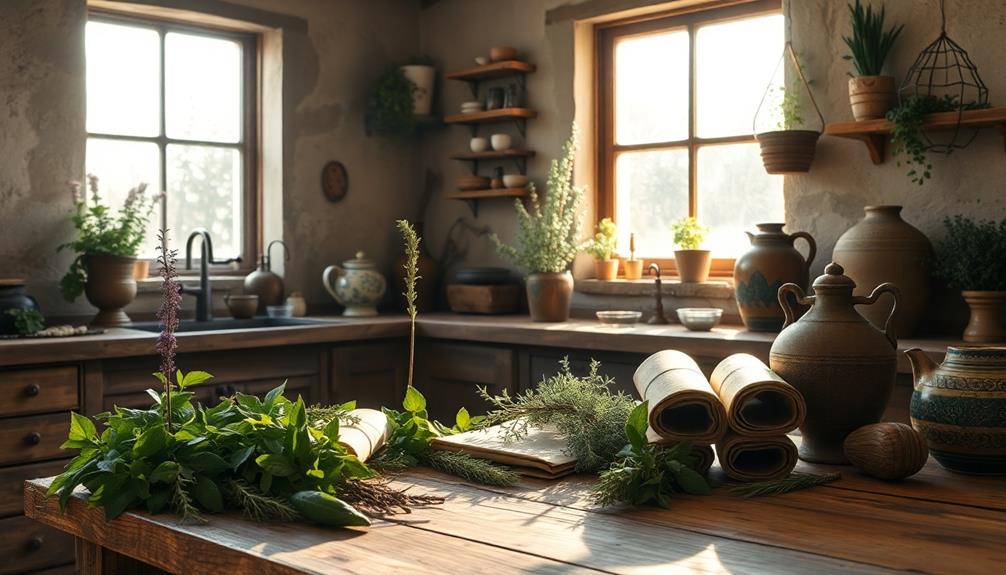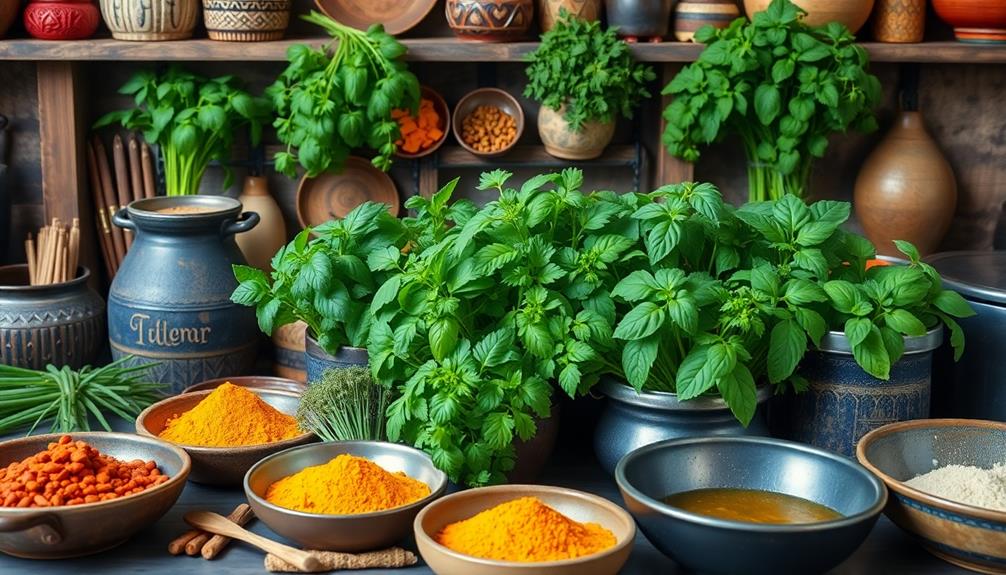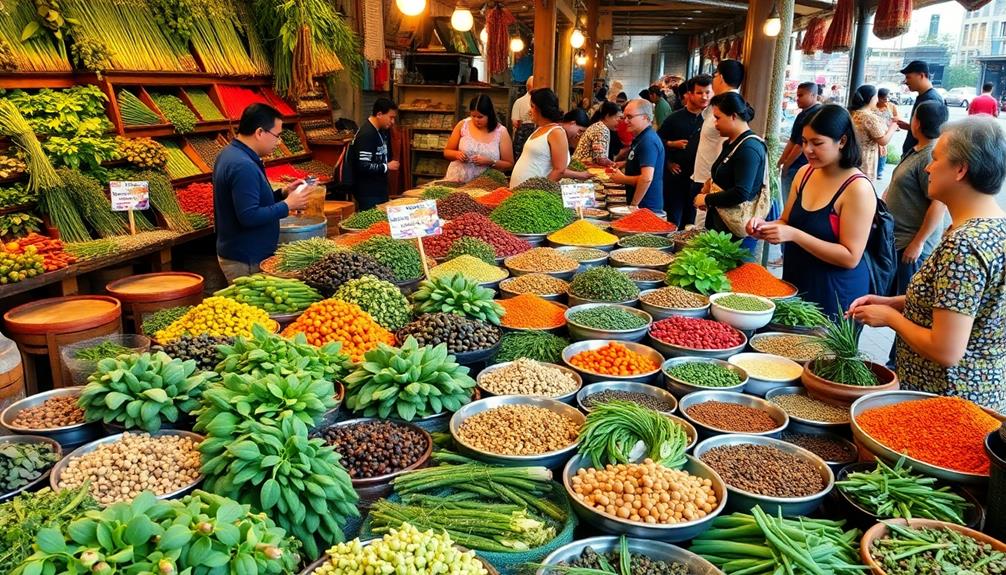Some cultures prioritize medicinal herbs in their cuisine because these herbs boost flavor and provide health benefits. In many societies, food isn't just about sustenance—it's integral to health and wellness. For instance, Traditional Chinese Medicine emphasizes the relationship between food and medicine, promoting longevity and illness prevention. Herbs like ginger and garlic offer proven health advantages, which make them valued staples. Cultural traditions often pass these practices down through generations, reflecting a holistic approach to cooking. If you're curious about how different cultures incorporate these herbs, you'll find even more fascinating insights.
Key Takeaways
- Many cultures view food as integral to health, blending culinary traditions with medicinal practices for holistic wellness.
- Traditional systems, like TCM, emphasize the preventative benefits of herbs, promoting longevity through diet.
- Herbal knowledge is often passed through generations, reinforcing cultural significance and practices in cuisine.
- The health benefits of herbs, such as anti-inflammatory and detoxifying properties, encourage their inclusion in daily meals.
- Increasing consumer interest in natural remedies reflects a shift towards prioritizing medicinal herbs in modern diets.
Historical Significance of Medicinal Herbs

Medicinal herbs have been woven into the fabric of human history, shaping culinary practices across cultures. You'll find that traditional Chinese medicine emphasizes the integration of food and medicine, highlighting a holistic approach to health and wellness.
This connection between culinary use of herbs and their medicinal properties has persisted for thousands of years, with ancient texts documenting their benefits. In Ethiopian cuisine, for example, ingredients like Yeselata (Ethiopian Salad) showcase the use of fresh vegetables, which not only provide flavor but also contribute to health through their nutritional value.
The spice trade played an essential role in this historical significance, as routes facilitated the exchange of valuable herbs like pepper, cinnamon, and cloves. These weren't just commodities; they became integral to cultural identity, influencing regional cuisines and their unique flavor profiles.
The introduction of new medicinal plants, such as vanilla and cocoa from the Americas, further expanded the repertoire of herbs, enriching both culinary traditions and natural remedies.
As you explore the historical significance of medicinal herbs, consider how their healing properties continue to impact modern cooking. The fusion of flavor and health in your meals not only honors past practices but also contributes to your well-being, reflecting the enduring legacy of these remarkable plants in our kitchens and lives.
Cultural Beliefs and Practices

Culinary traditions often reflect deep-rooted cultural beliefs and practices surrounding health and wellness. In many cultures, food isn't just about sustenance; it's an essential aspect of medicinal and holistic health.
For example, Traditional Chinese Medicine (TCM) emphasizes the medicinal properties of culinary ingredients, viewing food as crucial in preventing illness and promoting longevity. You might find that the Amazigh people incorporate medicinal herbs into their cuisine, blending nutritional and therapeutic benefits seamlessly.
Similarly, Japanese cuisine showcases this connection through ingredients like umeboshi (pickled plum), which is believed to aid digestion and enhance overall health.
Historical texts illustrate how various cultures have long integrated food and medicine, showcasing the belief in the health benefits of herbs and spices. This connection is evident in holistic health approaches, where dietary choices align with the energetic properties of food, such as the yin and yang concept in TCM.
Moreover, cultural practices surrounding the consumption of herbal medicine are often passed down through generations. This transmission of knowledge highlights the importance of traditional practices and their impact on community health.
Health Benefits and Nutritional Value

Herbs play a significant role in enhancing both the flavor and nutritional value of meals. These medicinal plants, rich in phytochemicals, offer a range of health benefits, including anti-inflammatory and antioxidant properties that contribute to your overall wellness and disease prevention.
In both East and West, culinary practices frequently incorporate herbs like ginger and turmeric. Modern research backs their traditional medicine uses, showing they aid digestion and reduce inflammation. For instance, the use of spices in dishes like Kawarma (Preserved Meat) not only elevates the taste but also brings various health benefits associated with the spices used.
When you add garlic and cilantro to your dishes, you're not just boosting flavor; you're also tapping into potential cardiovascular benefits and detoxifying properties. Regularly consuming herbs like basil and parsley can improve nutrient absorption and provide essential vitamins and minerals, making your diet more balanced.
Cultures worldwide recognize the role of these herbal medicines, emphasizing their importance in promoting health and preventing illness. By integrating these herbs into your meals, you're not just enjoying delicious food; you're also supplementing your nutritional intake with naturally sourced ingredients.
Integration in Culinary Traditions

Harmony in cooking often stems from the seamless integration of flavor and health, a principle embraced by various cultures around the world. Many culinary traditions recognize that food isn't just for sustenance; it's essential for wellness.
For instance, Traditional Chinese Medicine (TCM) emphasizes the use of medicinal herbs to enhance health and prevent illness, weaving these elements into daily meals.
In Mediterranean diets, you'll find fresh herbs like parsley and basil used not only for their delightful flavors but also for their numerous health benefits.
Similarly, in Indian cuisine, Ayurvedic principles celebrate spices such as turmeric and ginger for their anti-inflammatory properties, showcasing the deep ties between food and well-being.
Cultural differences further enrich this integration, as Mexican cuisine also incorporates herbs like cilantro and epazote, valued for their medicinal effects.
These practices often get passed down through generations, with specific recipes designed to maximize both culinary and therapeutic benefits.
Modern Trends and Consumer Behavior

Embracing the resurgence of interest in herbal remedies, many consumers are shifting away from synthetic products in favor of natural options. This trend, especially pronounced after the COVID-19 pandemic, highlights a growing demand for immunity-boosting remedies.
You might notice that about 86% of Slovenians use medicinal herbs at least occasionally, despite nearly half being unfamiliar with them. This gap indicates that familiarity with these herbs greatly influences consumer behavior, affecting perceptions of their usefulness.
The principles of food and medicine homology, often seen in Chinese medicine, are gaining traction as people seek to integrate cultural traditions into their daily lives. Scientific research further supports the benefits of medicinal herbs for maintaining health, driving interest among various demographics.
Curiously, women and individuals over 55 tend to consume these herbs more frequently, often seeking relief for chronic conditions.
Additionally, over 60% of Slovenians believe that medicinal herbs should be covered by health insurance, emphasizing a desire for better integration of herbal remedies within healthcare policies.
As modern trends evolve, you'll find that the appreciation for medicinal herbs continues to grow, reshaping the culinary landscape.
Frequently Asked Questions
Why Are Medicinal Herbs Important?
Medicinal herbs are important because they offer numerous health benefits, enhancing your well-being. Their anti-inflammatory, antibacterial, and antioxidant properties can support your body's functions, making them valuable additions to your diet and health practices.
What Cultures Believe in Herbal Medicine?
You'll find that cultures like Traditional Chinese Medicine, Ayurveda, and Indigenous practices believe in herbal medicine. These traditions emphasize using plants for healing, showcasing a deep-rooted connection between health, food, and cultural identity.
Why Are Herbs Important in Chinese Medicine?
Herbs are essential in Chinese medicine because they enhance your health through a holistic approach. They balance yin and yang, support important functions, and provide natural remedies for everyday wellness, ultimately promoting longevity and vitality.
Which Country Has Most Medicinal Herbs?
Did you know China boasts over 11,000 species of medicinal herbs? When you explore Traditional Chinese Medicine, you'll discover the depth of knowledge and practices surrounding these herbs, making China the leader in medicinal herb diversity.
Conclusion
Incorporating medicinal herbs into cuisine isn't just about flavor; it's about embracing a rich heritage and nurturing health. As you explore different cultures, you'll discover that these herbs serve a purpose beyond the plate. By choosing to include them in your meals, you're not just spicing things up—you're honoring age-old traditions that have stood the test of time. So, why not take a leaf out of their book and enrich your culinary experiences with these vibrant, healing ingredients?









